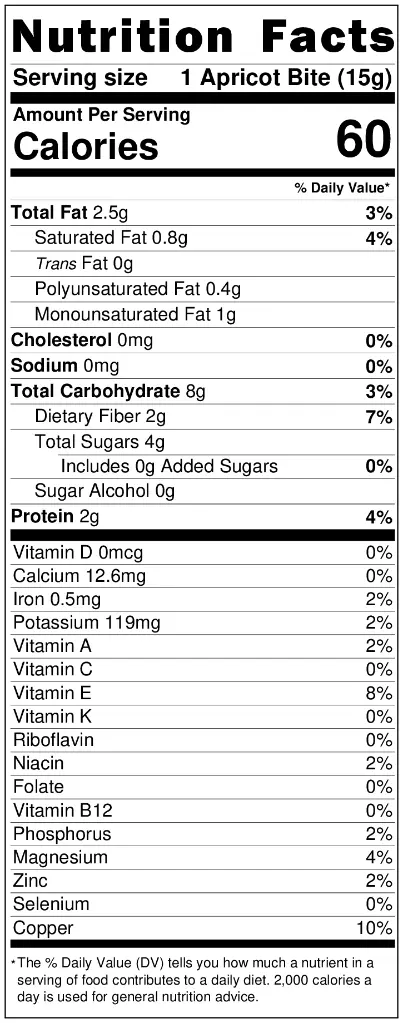Quantity
12 Bites
Ingredients
Apricots , Almond , Oat , Coconut and Carberry
Storage & Validity
Stored in an airtight container :
Up to 7 days in room temperature
Up to 15 days in fridge
Allergen & Intolerance awareness
Almond & Coconut
Health Benefits
- Energy Boost: The oats and the natural sugars in the dried apricot and cranberry provide carbohydrates, which are your body's primary source of energy. The nutrition facts show 8g of total carbohydrates per serving.
- Fiber Power: Oats, dried apricot, and dried cranberry are all good sources of dietary fiber. The nutrition facts indicate 2g of dietary fiber per serving (7% of your daily value). Fiber aids in digestion, helps regulate blood sugar levels, and can contribute to feelings of fullness.
- Healthy Fats: Coconut flakes contribute healthy fats, including saturated and monounsaturated fats (as shown in the nutrition facts with 0.8g saturated and 1g monounsaturated fat). These fats can contribute to satiety and overall health.
- Nutrient-Dense ( Vitamins and Minerals ) : Dried apricots and cranberries contain various vitamins and minerals. The nutrition facts highlight the presence of potassium (119mg), vitamin E (8% DV), iron (0.5mg), magnesium (2% DV), zinc (2% DV), and copper (10% DV), among others. These micronutrients play essential roles in numerous bodily functions.
- Antioxidants: Dried apricots and cranberries are known to be sources of antioxidants, which help protect your cells from damage.
- Prebiotic Content : Oats contain beta-glucans, a soluble fiber known for its prebiotic effects. Prebiotics nourish beneficial bacteria in your gut, contributing to a healthy digestive system. Therefore, your bites, thanks to the oat content, do have prebiotic properties.
What is the role of prebiotics in maintaining gut health?
Prebiotics are essential for maintaining a healthy gut microbiome. They help
- Promote the growth of beneficial bacteria, such as bifidobacteria and lactobacilli
- Improve digestion and absorption of nutrients
- Boost the immune system
- Reduce inflammation
- Reducing the risk of chronic diseases, such as obesity, diabetes, and heart disease
Best time to enjoy it
- Mid-Morning or Afternoon Snack: They provide a healthy way to bridge the gap between meals and prevent energy dips.
- Pre-Workout Fuel: The carbohydrates offer a readily available energy source before exercise. Consume one 30-60 minutes prior to your workout.
- Post-Workout Recovery: The carbohydrates help replenish glycogen stores after exercise, and the protein (2g as per the nutrition facts, likely slightly higher with the addition of almonds) aids in muscle repair.
- Quick Breakfast Component: Pair a bite or two with fruit or yogurt for a quick and nutritious start to your day.
Friend With
- Diabetes
- POS
- Insulin resistance
- Hypertension
- High Cholesterol
- Lactose intolerance
- Gluten allergy
- Casein allergy
- ASD & ADHD
- Vegan
Free of
- Trans Fat
- Sodium
- Gluten
- Casein
- Lactose
- Added Sugar
Low in
- Fat
- Carbohydrates
Rich in
- Copper ( 10 % DV )
Considerations
- Calorie Density: While these bites are nutritious, they can be calorie-dense due to the dried fruits, nuts, and coconut. If you're monitoring your calorie intake, be mindful of your portion sizes. The provided nutrition facts indicate 60 calories per bite, so adjust your consumption accordingly.
- Natural Sugars: Dried fruits are naturally high in sugars. While these are different from added sugars, they can still impact blood sugar levels, especially if consumed in large quantities. If you have diabetes or are monitoring your blood sugar, consume them in moderation. The nutrition facts show 4g of total sugars per bite.
- Fat Content: Coconut flakes and almonds contribute to the fat content of these bites. While these are mostly healthy fats, it's still important to consume them as part of a balanced diet and be aware of your overall fat intake. The provided nutrition facts show 2.5g of total fat per bite.
- Digestive Sensitivity: The high fiber content can be beneficial, but if you're not used to a high-fiber diet, consuming too many at once might lead to digestive discomfort such as bloating or gas. Introduce them gradually.
In order to maintain a balanced health system
- Eating 1-2 pieces per day is considered a moderate amount. However, individual needs may vary depending on total calorie intake, nutritional goals, and activity level.
- For diabetes and insulin resistance, it is recommended to eat only one piece 1-3 times a week after a full meal, depending on the daily calories specified.
- For ASD & ADHD please consult your doctor to determine the quantity.



